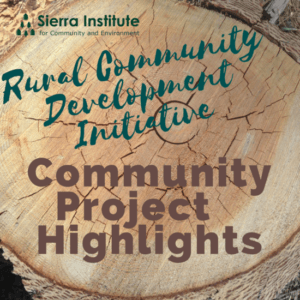 This is the first post in this month’s blog series highlighting our RCDI project. Throughout March, I will be highlighting several community projects from Sierra Institute’s RCDI network.
This is the first post in this month’s blog series highlighting our RCDI project. Throughout March, I will be highlighting several community projects from Sierra Institute’s RCDI network.
Through our Rural Community Development Initiative (RCDI), Sierra Institute has supported nine rural communities as they navigate the complex process of developing bioenergy facilities and wood products businesses, and engaged additional partner communities interested in this work. These projects are led by non-profit organizations, special districts, and other community groups with the goal of increasing local employment opportunities by utilizing their most abundant resource: wood. Specifically, they are trying to create a market for low-value wood: small diameter trees, branches, and the byproducts of forest restoration. This material is important to remove from California’s dense, dry forests because it serves as excess fuel when wildfire strikes, but its low market value means that it is usually piled and burned in the forest. These communities are trying to change all that. They realized that if there wasn’t a market for this material, then they would have to create one themselves.
Some of the communities are focused on using bioenergy as a solution. Small three megawatt facilities could convert low-value wood into electricity to be sold to utilities like Pacific Gas and Electric, and also produce heat for a wood products campus. Many realized early on that the success of these facilities would depend on creating a network of businesses on a wood products campus. For example, one business could produce poles or firewood, using the scraps to create wood chips to power a bioenergy facility, which in turn could sell electricity and produce heat for a greenhouse. In other instances, communities are working towards providing heat for public buildings. Unfortunately, getting so many variables to line up just right has not been as easy as they’d hoped.
It has been an uphill battle. Most of the groups had little experience or expertise in wood utilization when they started this work, often they have limited staff and budgets and depend on volunteers and outside support. Many of these organizations received early support from small grants, and direct technical and legal assistance from RCDI. Communities often didn’t know a great deal about bioenergy when they started these projects, but have continued to learn as they go, facing unexpected challenges along the way. Their work is not done, but they’ve made significant progress over the last few years, working through the complicated processes of financing, environmental review and permitting, interconnection, brownfields site assessment and cleanup, ensuring consistent fuel supply, and understanding the technology well enough to decide which system to use.
Every Friday for the rest of this month, I will highlight the work of one community from the RCDI network. These partners are community leaders trying to advance projects that will address multiple problems facing the community and benefit both people and the forests they call home.
Until next time,
Lauren Burton


